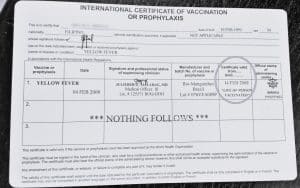Stay Healthy While Traveling: Understanding the Yellow Fever Vaccine Requirements for Kenya and Tanzania
Whether you’re an adventurous backpacker or a luxury traveler, staying healthy is always a top priority when exploring new destinations. If you’re planning a trip to Kenya and Tanzania, and asking, ‘Do I need yellow fever vaccine for Kenya and Tanzania? The answer is yes, you do, and it’s important to understand the yellow fever vaccine requirements to ensure a safe and enjoyable journey.
Yellow fever is a viral disease transmitted by infected mosquitoes. While it is not a common concern for travelers in many areas, it is prevalent in certain parts of Africa, including Kenya and Tanzania. As a result, both countries require travelers to show proof of yellow fever vaccination upon arrival.
The yellow fever vaccine is highly effective in preventing the disease and is recommended for all travelers visiting areas with a risk of exposure. It is important to note that the vaccine needs to be administered at least 10 days before travel to ensure full protection.
By adhering to the yellow fever vaccine requirements, you can protect yourself and help prevent the spread of the disease. So, before embarking on your African adventure, consult your healthcare provider or visit a travel clinic to get the necessary vaccinations and stay healthy while exploring Kenya and Tanzania.
Importance of getting vaccinated before traveling to Kenya and Tanzania

Getting the vaccinations needed for Kenya and Tanzania is crucial for your health and the safety of those around you before traveling. Yellow fever is a serious disease that can cause symptoms ranging from mild fever and headache to severe liver damage and even death. The risk of contracting yellow fever is higher in certain areas of Kenya and Tanzania, especially in rural areas where mosquito populations are more abundant.
By getting the vaccines needed for Kenya and Tanzania before traveling, you not only protect yourself from the disease but also play a role in preventing its spread. Mosquitoes can transmit the virus from an infected person to a healthy individual, so getting vaccinated helps break the chain of transmission. Additionally, some countries require proof of yellow fever vaccination for entry, and without it, you may be denied entry or face quarantine upon arrival.
It’s important to note that the yellow fever vaccine is safe and highly effective. Serious side effects are rare, and the benefits of protection far outweigh any potential risks. So, make sure to prioritize your health and get vaccinated before your trip to Kenya and Tanzania.
Yellow fever vaccine requirements for Kenya and Tanzania

If you are asking, ‘What vaccinations do I need for Kenya and Tanzania?’ you are in the right place. One of the vaccines you need before embarking on this trip is the yellow fever vaccine. Both Kenya and Tanzania have strict yellow fever vaccine requirements for travelers entering their countries. It is mandatory for all travelers aged 9 months and older to show proof of yellow fever vaccination upon arrival. Failure to provide the required documentation may result in denial of entry or quarantine.
To meet the yellow fever vaccine requirements, you must have a valid International Certificate of Vaccination or Prophylaxis (ICVP). This certificate serves as proof that you have received the yellow fever vaccine and is recognized internationally. The ICVP should be issued by an authorized healthcare provider and must contain your personal information, the date of vaccination, the vaccine manufacturer, and the batch number.
It is important to note that the yellow fever vaccine needs to be administered at least 10 days before your travel date to ensure full protection. This waiting period allows your body to develop the necessary immunity against the virus. Therefore, it is advisable to plan your vaccination well in advance of your trip to Kenya and Tanzania.
Where to get the yellow fever vaccine
To get the yellow fever vaccine, you can consult your healthcare provider or visit a travel clinic. Yellow fever vaccination is available at many healthcare facilities, including hospitals, clinics, and specialized travel medicine centers.
Before visiting a healthcare provider or travel clinic, it is recommended to call ahead and inquire about the availability of the yellow fever vaccine. Some healthcare facilities may require an appointment or have specific hours for administering travel vaccinations.
It’s important to note that the yellow fever vaccine may not be available in all healthcare facilities. Therefore, it is advisable to research and locate a clinic or healthcare provider that offers the vaccine before your trip to Kenya and Tanzania. This will ensure that you can get the vaccine in a timely manner and fulfill the yellow fever vaccine requirements.
Yellow fever vaccination process and side effects
Yellow fever is among the vaccinations needed for Tanzania and Kenya trip. The process is straightforward and usually involves a single injection. The vaccine contains a weakened form of the yellow fever virus, which stimulates your immune system to produce protective antibodies. These antibodies provide immunity against the virus, should you be exposed to it in the future.
The vaccination itself is relatively quick and painless. A healthcare professional will administer the vaccine into the upper arm using a small needle. After the injection, you may experience some mild side effects, such as soreness at the injection site, mild fever, headache, or muscle aches. These side effects are usually temporary and subside within a few days.
Serious side effects from the yellow fever vaccine are rare. However, in rare cases, some individuals may experience more severe reactions, such as an allergic reaction. If you have a history of severe allergic reactions or any concerns about receiving the vaccine, it is important to discuss them with your healthcare provider before getting vaccinated.
Other health precautions to take while traveling to Kenya and Tanzania
In addition to getting the yellow fever vaccine, there are other health precautions you should take while traveling to Kenya and Tanzania. These measures will help protect you from various diseases and ensure a safe and healthy journey.
- Mosquito bite prevention: Since yellow fever is transmitted through mosquito bites, it’s important to take steps to prevent mosquito bites. Use insect repellent containing DEET or other recommended ingredients, wear long-sleeved shirts and long pants, and use bed nets or screens to keep mosquitoes away.
- Malaria prevention: Both Kenya and Tanzania are malaria-endemic countries, so it is important to take precautions to prevent malaria. Consult your healthcare provider about antimalarial medication and follow their recommendations. Additionally, take measures to reduce exposure to mosquitoes, such as using bed nets, wearing protective clothing, and using insect repellent.
- Food and water safety: To avoid foodborne illnesses, practice good hygiene and drink only bottled or purified water. Avoid consuming raw or undercooked food, and peel fruits and vegetables before eating them.
- Sun protection: Kenya and Tanzania have a tropical climate, so it’s important to protect yourself from the sun. Wear sunscreen with a high SPF, a hat, and sunglasses to protect your skin and eyes from harmful UV rays.

Taking these health precautions will significantly reduce your risk of contracting diseases and ensure a smoother and more enjoyable travel experience.
Travel insurance for medical emergencies
While taking all the necessary precautions can greatly minimize your risk of health issues while traveling, unexpected medical emergencies can still occur. That’s why it is highly recommended to have travel insurance that covers medical expenses.
Travel insurance provides financial protection in case of accidents, illnesses, or medical emergencies during your trip. It can cover expenses such as hospitalization, medical treatments, emergency medical evacuation, and even trip cancellations or interruptions due to health-related reasons.
Before purchasing travel insurance, carefully review the policy to ensure it provides adequate coverage for your needs. Consider factors such as coverage limits, exclusions, and the process for filing claims. It is also important to disclose any pre-existing medical conditions to ensure proper coverage.
Having travel insurance will give you peace of mind knowing that you are financially protected in case of a medical emergency. It allows you to focus on enjoying your trip without worrying about unexpected healthcare expenses.
Common misconceptions about yellow fever and vaccinations
There are several common misconceptions surrounding yellow fever and vaccinations needed for Kenya and Tanzania that can lead to confusion and misinformation. Let’s address some of these misconceptions to ensure a better understanding of the disease and the importance of vaccination.
- Myth: Yellow fever is not a serious disease: Yellow fever can cause severe illness and even death. It is important to take it seriously and protect yourself by getting vaccinated.
- Myth: I don’t need the yellow fever vaccine if I’m not visiting rural areas: Yellow fever can be present in both urban and rural areas. It’s important to check the specific yellow fever risk areas in the countries you are visiting and get vaccinated accordingly.
- Myth: Once vaccinated, I am immune for life: While the yellow fever vaccine provides long-lasting immunity, it may not last a lifetime for everyone. Some countries require a booster dose after a certain number of years to maintain valid vaccination status.
- Myth: The yellow fever vaccine is not safe: The yellow fever vaccine is considered safe and has been used for decades. Serious side effects are rare, and the benefits of vaccination far outweigh any potential risks.
By understanding and dispelling these misconceptions, you can make informed decisions about your health and ensure you are adequately protected against yellow fever.
Tips for staying healthy while traveling in Kenya and Tanzania
In addition to getting the vaccines needed for Kenya and Tanzania and taking necessary health precautions, there are several other tips for staying healthy while traveling in Kenya and Tanzania. These tips will help you have a safe and enjoyable trip while minimizing health risks:
- Stay hydrated: Drink plenty of water to stay hydrated, especially in hot and humid climates. Carry a reusable water bottle and refill it with purified water whenever possible.
- Practice good hygiene: Wash your hands frequently with soap and water, or use hand sanitizer when soap is not available. This will help prevent the spread of germs and reduce the risk of infections.
- Eat at reputable establishments: When dining out, choose restaurants or food vendors that have good hygiene practices. Avoid eating street food or raw or undercooked food that may increase the risk of foodborne illnesses.
- Protect yourself from the sun: Apply sunscreen regularly, wear a hat and sunglasses, and seek shade during the hottest hours of the day to protect yourself from sunburn and heat-related illnesses.
- Be cautious with animals: Avoid contact with wild or stray animals, as they may carry diseases such as rabies. If you encounter an animal, keep a safe distance and do not attempt to touch or feed it.
- Stay updated on travel advisories: Check for any travel advisories or warnings issued by your country’s government or international health organizations before and during your trip. Stay informed about any potential health risks or safety concerns in the areas you plan to visit.
By following these tips and staying vigilant about your health, you can minimize the chances of falling ill and ensure a memorable and worry-free trip to Kenya and Tanzania.
Final thoughts on staying healthy during travel
Staying healthy while traveling is essential for a successful and enjoyable trip. When planning a journey to Kenya and Tanzania, it is important to understand and fulfill the yellow fever vaccine requirements. Getting the vaccinations needed for Tanzania and Kenya not only protects you from yellow fever but also helps prevent its spread.
In addition to vaccination, taking other health precautions, such as mosquito bite prevention, malaria prevention, and food and water safety measures, further reduces your risk of contracting diseases. It is also advisable to have travel insurance that covers medical emergencies to ensure financial protection in case of unexpected health issues.
By dispelling common misconceptions about yellow fever and vaccinations, you can make informed decisions about your health and protect yourself effectively. Lastly, by following general health tips such as staying hydrated, practicing good hygiene, and protecting yourself from the sun, you can further safeguard your well-being during your journey.
Remember, a healthy traveler is a happy traveler. So, prioritize your health, get vaccinated, and take the necessary precautions to stay safe and healthy while exploring the beautiful countries of Kenya and Tanzania. Happy travels!
For more articles related to Tourism in Tanzania, click here!


































